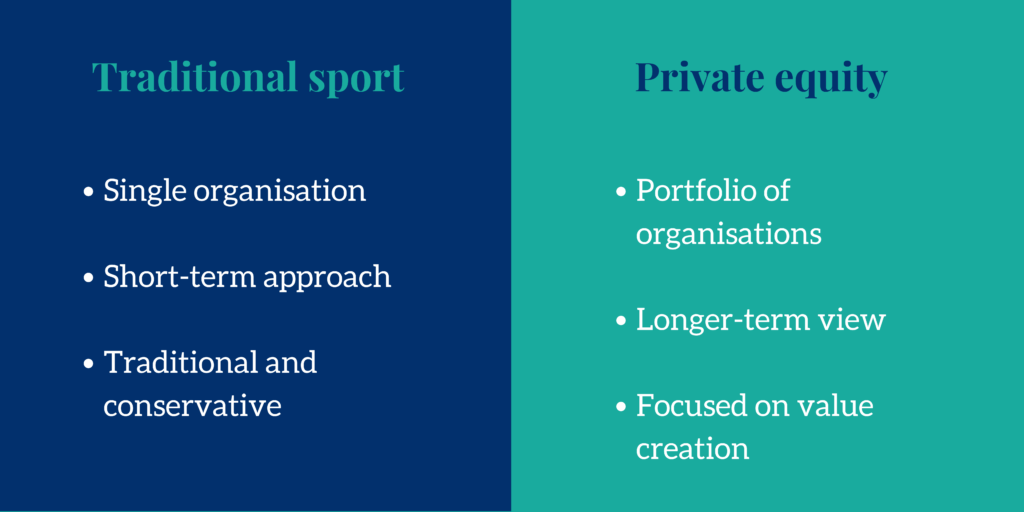With its increasing investment in the sector, and its unique ability to drive change, private equity organisations are well positioned to be a key actor in sport’s ecological transition
Around two-thirds of all new sponsorship revenue coming into British Olympic sport in 2022 came from British Cycling’s eight-year partnership with Shell, Andy Westlake of the European Sponsorship Association (ESA) told delegates at the BASIS Conference last week.
Considering the fact that there are more than 30 sports on the Olympic programme in Britain, that proportion is astounding.
You could look at this from a couple of perspectives: one is that, when presented with that kind of financial opportunity, sports organisations don’t have a choice but to take it. Another point of view could be that because of an apparent lack of commercial opportunities, companies from industries like oil and gas have the chance to swoop in and attempt to cleanse their image through alignment with popular sports and athletes.
But, instead of pointing fingers at individual organisations, we have to accept that this is a systemic problem for the sports industry. Why is it that commercial funding is so difficult to come by? Is it because of the challenging current financial landscape? Does the product (i.e. the sport or organisation) lack significant value, or does it fail to properly articulate its value?
Much of this comes down to the way sport is governed: traditionally very short-term in its thinking, conservative in its viewpoint and often with a nonprofit status, sport can be reactive in its approach to many critical issues, including commercialisation, digital transformation and sustainability.
And while it may seem counterintuitive to call for a more business-like, commercial approach to sports governance in order to drive environmental and social responsibility, it could be part of the answer.
In the last few years, private equity has come into sport in a big way, and the direction of travel indicates that won’t end anytime soon. Private equity and sustainability are two words you don’t commonly see in the same sentence, with a perception that the industry cares about profit and very little else. But, in their Harvard Business Review essay, Robert G. Eccles, Vinay Shandal, David Young and Benedicte Montgomery argue that private equity is in the perfect position to take the lead in sustainability. And they give a few reasons why.
Firstly, with projected assets of $11 trillion by 2026, the private equity industry is so large that “society won’t be able to tackle climate change” without its “active participation”. Secondly, the nature of private equity’s business model gives it a “clear advantage” in implementing sustainability; even when it doesn’t hold 100% shareholding, private equity firms have one or more of their representatives on the board across their portfolio of companies.
Having a portfolio of companies gives these firms an opportunity to roll out centralised sustainability strategies and operations across a number of industries. In a sector like sport, which hasn’t reached maturity, this could help to scale things up quickly.
If you look at the portfolio of CVC, for example, a private equity firm with €85 billion of assets, it owns or partly owns big sports properties in football, rugby, cricket, volleyball and tennis. Creating best practice approaches to sustainability for each of its organisations in these sports should help to permeate environmentally and socially responsible principles through each of those vertices.
Lastly, private equity companies often determine executive compensation and can use that leverage to weave in requirements around sustainability as well as financial performance.
The most important point made by the authors, particularly when looking at sport, is that these firms often “operate on a longer time horizon” than other organisations, giving a greater opportunity for leadership teams to implement their vision and invest in long-term projects, like sustainability.

Just after RedBird Capital Partners acquired Italian Serie A football team AC Milan, Gerry Cardinale, its founder and managing partner, stressed that his organisation came with a business plan, not just cash. His objective, he said, is to add value to what he called an “undervalued asset”, and deliver a “value proposition” to three main constituents – fans, Serie A and the city of Milan.
And, increasingly, a strategic approach to sustainability is a real value add for many of sport’s key stakeholders.
Private equity knows this; if you go to CVC’s website the first thing you see is the tagline ‘creating sustainable value’. Sustainability is the third option on its menu after ‘about’ and ‘strategies’, with sections dedicated to ESG reporting, DEI and climate.
RedBird and Blue Owl Capital (which has stakes in two NBA teams, Phoenix Suns and Sacramento Kings) are signatories to the Principles for Responsible Investment, which is centred on six principles focused around ESG and sustainability.
The former even has a ‘responsible investing policy’ that follows five guiding principles: integrity, transparency, empowerment, inclusivity and sustainability.
So the question is: if private equity companies are increasingly understanding the ability of sustainability to drive value, should we encourage more investment of this type in sport? And if we continue on the current trajectory, with more private equity funding going into sport, how can we leverage its approach to sustainability and ESG for the good of the industry?
While private equity has its drawbacks, it’s here to stay. And, echoing the sentiments of Eccles and his colleagues, it could be argued that private equity should be a key driver of sustainability in the sports industry considering its increasing reach and unique ability to drive change compared to other sports ownership and governance models.
It’s happening already. Eighteen months after agreeing a joint venture with the International Volleyball Federation (FIVB) to establish the commercial entity Volleyball World, the new vehicle inked an agreement with DHL that had a sharp focus on environmental sustainability and DEI.
Following its investment in La Liga, the top flight of Spanish football, CVC funded its Environmental Fair Play initiative – a two-year project to create a knowledge platform with the aim of improving environmental performance and “accelerating the global ecological transition”.
La Liga clubs received roughly half of the €2 billion invested by CVC when it took an 8.2% stake in the league’s media rights business. Around 70% of the money received by clubs must go towards improved infrastructure, much of which will be spent on sustainable materials and innovation.
Real Mallorca, one of those clubs, has used that funding to transform its Son Moix stadium with a rainwater collection system and the installation of 232 LED projectors for lighting the pitch. Plans are also afoot to integrate a large solar panel system to cover a proportion of the stadium’s energy needs.
There’s an opportunity here. And while sport should approach with caution (not all private equity firms are made equal), maximising the benefits of this private equity investment boom could – and hopefully will – see a greater push towards sustainability and ESG principles.
Opt into our weekly newsletter for exclusive content focused on sustainability strategy, communication and leadership for sport’s ecosystem.










Leave a Comment
Your email address will not be published. Required fields are marked with *